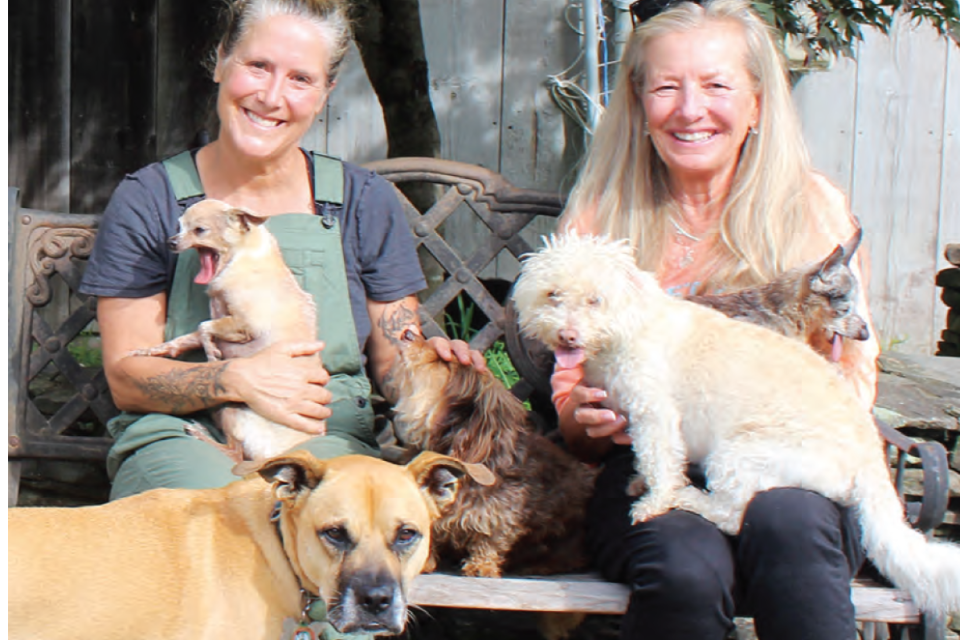BOXFORD, MA – August 29 is a date that changed the life direction of Cynthia Sweet, who founded and heads Sweet Paws Rescue.
Twenty years ago on that date, Hurricane Katrina, one of the deadliest storms to hit the U.S., overwhelmed the New Orleans’ levees and flooded the city, drowning residents who did not evacuate, and pets, who had no chance.
When Sweet saw news coverage of the hurricane, she focused on a shot of a dog on a rooftop helpless and alone trying to stay above the flood. She booked herself a one-way airplane ticket and spent the next weeks doing what she could to save the threatened animals.
“Katrina changed my life,” Sweet said. After the hurricane, she took a totally different path.
Now she has another, equally challenging mission. On the same date this year, Sweet and her team, including full-time volunteer Judy Luff, bought the 20-acre Spring Tide Farm and began turning the Kathy Borylo’s horse farm into the group’s Forever Home to rescue abandoned dogs, cats and some farm animals so they can be adopted.
Her goal now is to raise $2.5 million to renovate and repurpose the farm. That effort is on-going starting next week with its annual Barktoberfest, which will be on Saturday, Oct. 18 at the Spencer-Peirce-Little Farm, 5 Little’s Lane, Newbury. The annual event, its 10th, will celebrate with music, food trucks and memories of all the animals rescued by the group.
In January, Sweet Paws also plans to host a fundraising gala at the Black Swan Country Club in Georgetown. Sweet, who dresses most days in overalls, said she is not really a gala-type person, but to raise money to keep saving animals, she will dress up.
The non-profit Sweet Paws, which has saved more than 22,000 dogs and cats since she founded the non-profit rescue in 2011, is still saving animals from the Deep South.
A little more than half of the dogs and cats it rescues were abandoned in two poor counties in Mississippi and Alabama, where the problem of overpopulation is acute.
Calling SpringTide Farm on the web page “a beloved landmark in the community,” Sweet said buying this farm has helped accelerate the organization’s future plans.
In addition to existing driveways and utility infrastructure, the farm has an existing barn with 30 stalls that Sweet Paws can transform into quarantine spaces for dogs brought to Massachusetts. There is also a house for Sweet, the only employee, and miles of trails through conservation land that are perfect for walking the dogs.
“The purchase of the Boxford property marks the completion of Phase 1 of the capital campaign,” the web site states. “But while this is a significant achievement, the work is far from over. We still have two important phases left.”
Phase two will include renovations to the barn, building a large, fenced-in play yard and creating a Casa de Cats, a sanctuary at the rear of the barn that will have an outdoor “catio” (a cat patio) for adoptable and special needs cats.
Sweet and her team of about 350 volunteers and adopters also plan to launch community education programs to teach about caring for animals humanely. They also plan to build a veterinary suite.
Every two weeks a truck arrives from its southern team of 10 volunteers, bringing dogs and cats they have found “all over the place” in distressed conditions, she said. These trucks used to bring 90 percent of the animals that Sweet Paws finds homes for here.
But as the market for adoptions is becoming saturated here, the rescue finds that almost half of its animals come from local homes that can no longer afford to care for their pets.
Sweet said veterinary bills have risen significantly in recent years because locally owned clinics are being sold to corporations, which have raised the fees.
With a slogan, “Saving People One Animal at a Time,” Sweet Paws operates on an annual budget of about $1 million.
Its adoption fees, a major source of funding, along with donations, run $525 for dogs and $625 for puppies. Senior dogs can be adopted for $350.
For more information, visit its website at www.sweetpawsrescue.org. ♦




